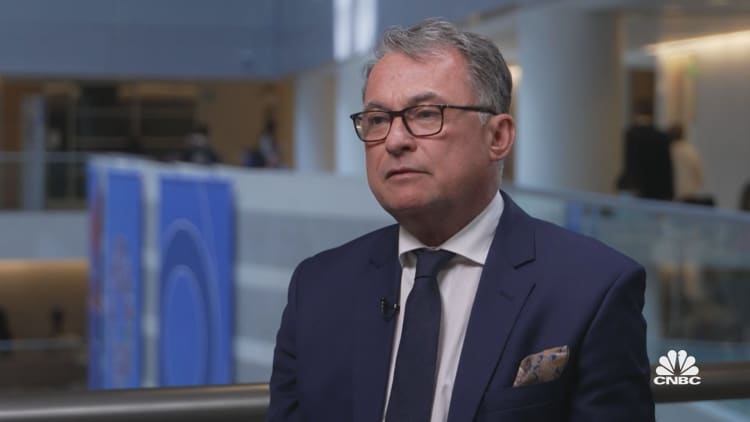‘Energy crisis is solved,’ German economy is safe
The headquarters of the European Central Bank (ECB) pictured on February 03, 2022 in Frankfurt, Germany.
Thomas Lohnes | Getty Images News | Getty Images
Germany’s energy worries are over and Europe’s largest economy has the “inherent strength” to recover from the dual shocks of the pandemic and the war in Ukraine, according to Bundesbank President Joachim Nagel.
The International Monetary Fund on Tuesday projected the German GDP will contract by 0.1% in 2023, becoming the second worst performer among major economies behind the U.K., before expanding by 1.1% in 2024.
Central to concerns about the economic outlook for Germany and the wider continent over the past year has been the potential for an energy crisis, as Europe strives to curb its reliance on Russian gas following Moscow’s full-scale invasion of Ukraine.
German output decreased by 0.4% in the fourth quarter and is expected to contract again in the first quarter of 2023, entering a technical recession.
Nagel told CNBC on the sidelines of the IMF Spring Meetings that he is “more positive than the IMF” and does not see a recession this year.
“The German economy proved a lot over the past couple of weeks and months, so the adaptation capacity of the German industry is pretty high, the energy crisis is more or less solved. So we had a really worried situation in the past, but this is now over, and the outlook is good,” he told CNBC’s Joumanna Bercetche.

He asserted that Germany’s progress in diversifying its liquefied natural gas supply away from Russia, and its increased storage — resulting from built up capacity during the mild winter — meant the country’s economy is well placed to weather the next cold season as well.
The latest available purchasing managers’ index readings showed German manufacturing, which accounts for around a fifth of the country’s economy, experienced its sharpest fall in activity for almost three years in March and hit its lowest level since May 2020.
However, Nagel claimed that this was down to lingering effects of the Covid-19 pandemic and Russia’s war in Ukraine, insisting that “we shouldn’t forget where we came from.”
“The German industry has a good capability to deal with the situation, there is this inherent strength of the German economy, and I believe they will overcome this, and they will go back to the levels we saw before the pandemic,” he said.
Sticky core inflation
The European Central Bank hiked interest rates by another 50 basis points in March to bring its main rate to 3%, as the continent continues to grapple with high inflation.
Headline inflation across the euro zone fell to 6.9% in March from 8.5% in February, driven by cooling energy costs. But core inflation — which strips away volatile food, energy, alcohol and tobacco prices — increased to an all-time high of 5.7%.
Nagel said the persistence of high core inflation showed the ECB Governing Council, in which he is considered one of the more hawkish members, has further to go in tightening monetary…
Read More: ‘Energy crisis is solved,’ German economy is safe
